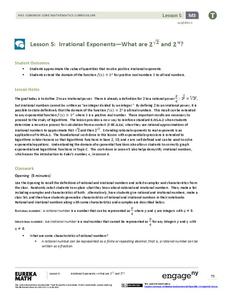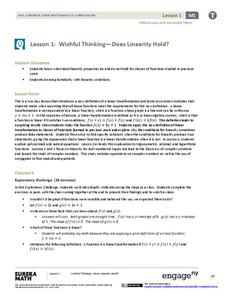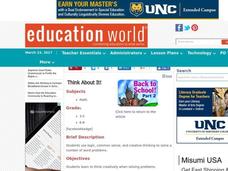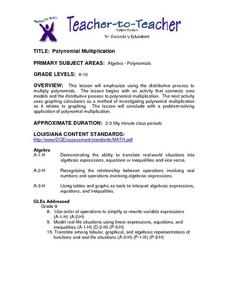Kelly's Kindergarten
April Daily Resources
Spring has sprung in your classroom! An entire month of activities relating to spring prompts learners to color, draw, write, and work on phonics.
EngageNY
How Far Away Is the Moon?
Does the space shuttle have an odometer? Maybe, but all that is needed to determine the distance to the moon is a little geometry! The lesson asks scholars to sketch the relationship of the Earth and moon using shadows of an eclipse....
Mathematics Assessment Project
Matching Situations, Graphs and Linear Equations
What do guitars, candles, and helicopters have in common? They're all in this resource. Learners complete an assessment task to determine the amount of profit made in a guitar class based on given information regarding variable...
EngageNY
Multiplying and Dividing Rational Expressions
Five out of four people have trouble with fractions! After comparing simplifying fractions to simplifying rational expressions, pupils use the same principles to multiply and divide rational expressions.
EngageNY
The Converse of the Pythagorean Theorem
Is it a right triangle or not? Introduce scholars to the converse of the Pythagorean Theorem with a lesson that also provides a proof by contradiction of the converse. Pupils use the converse to determine whether triangles with given...
EngageNY
Dividing Fractions and Mixed Numbers
Class members discover how to extend division to fractions to mixed numbers. Individuals first review how to convert mixed numbers to improper fractions and then apply division strategies learned in previous lessons. A memory game tests...
National Gallery of Canada
My Upside-Down World!
M.C. Escher is famous for creating optical illusions. Examine this effect in several of his works and discuss the techniques involved. Inspired by the discussion, learners create an imaginary 3-D world inside of a box using various...
Arts Ed Washington
Art Lessons in the Classroom: Our Family
Blend art and family into one lesson with an activity involving oil pastels and watercolors. After viewing a few famous portraits of families, learners create masterpieces that represent their own families.
EngageNY
Irrational Exponents—What are 2^√2 and 2^π?
Extend the concept of exponents to irrational numbers. In the fifth installment of a 35-part module, individuals use calculators and rational exponents to estimate the values of 2^(sqrt(2)) and 2^(pi). The final goal is to show that the...
EngageNY
Wishful Thinking—Does Linearity Hold? (Part 1)
Not all linear functions are linear transformations — show your class the difference. The first lesson in a unit on linear transformations and complex numbers that spans 32 segments introduces the concept of linear transformations and...
EngageNY
Comparing Linear Functions and Graphs
How can you compare linear functions? The seventh installment of a 12-part module teaches learners how to compare linear functions whose representations are given in different ways. They use real-world functions and interpret features in...
EngageNY
True and False Number Sentences II
Substitution is still the method of choice to verify number sentences. The detailed lesson has young mathematicians determining conditions for when number sentences are true or false through substitution. They learn to express these...
Curated OER
Think About It!
Students complete ten problems on a "Think About It" worksheet. They can also take a quiz online.
Curated OER
Fraction and Decimal Review Podcast
Students create podcasts of information for reviewing fractions and decimals in this math-based creative project. The lesson uses GarageBand, iTunes, iTalk, and Keynote to accomplish tasks.
Curated OER
Energy Inspiration Document and Website Production
Seventh graders conduct a web quest to find information on types of energy found in US. In this earth science lesson, 7th graders investigate the environmental consequences of using these resources. They develop a creative presentation...
Curated OER
Polynomial Multiplication
Students review information about how to multiply polynomials and then work in pairs to complete a worksheet. They use graphing calculations to help them solve their math problems.
Curated OER
Electricity Newsletter
Students create a newsletter about electricity. They view a completed newsletter and discuss its information and format and research the Internet to find facts about electricity. After researching their facts, they write a rough draft of...
Curated OER
Alexander and the Wind-Up Mouse
Dramatic activities promote enjoyment of literature, increase reading comprehension, and help develop oral expression. It is important for children to engage in activities which help to develop their creative potential. Drama allows...
Curated OER
See If You Can Draw
Learners create works of art by solving art problems in this game for the elementary classroom. Pencils and paper are the suggested materials, but the lesson plan can be adapted in various ways for different levels and circumstances.
Institute of Electrical and Electronics Engineers
Program Your Own Game
Learners study basic computer programming and the work of software engineers. In this creative instructional activity students create their own software game.
Curated OER
Discovering Euler's Theorem
Students identify different parts of a prism and polyhedra. In this geometry lesson, students identify the number of faces, edges and sides of polygons. They solve problems by recognizing patterns.
Curated OER
Ceva’s Theorem
Students prove and use Ceva's Theorem to solve problems. In this geometry lesson, students analyze polygons for patterns and calculate the area of each shape. They relate polygons to the real world.
Curated OER
Exploring Quadratic Graphs
Students solve quadratic equations using graphs. For this algebra lesson, students factor quadratic equations and graph their answer. They discuss the shape of their graph based on the function.
Curated OER
Mardi Gras Madness
CStudents create a sensory chart in on the topic of Mardi Gras. They design a brainstorm web using Inspiration and complete creative writing assignment. Students write a poem about Mardi Gras that is presented to the class at the final...

























